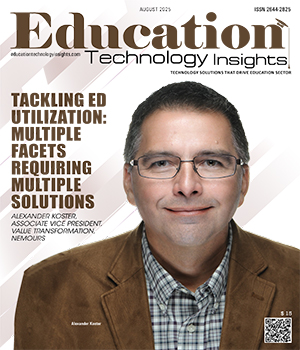THANK YOU FOR SUBSCRIBING
Be first to read the latest tech news, Industry Leader's Insights, and CIO interviews of medium and large enterprises exclusively from Education Technology Insights
Maximising Technology in the Biology Classroom
Marcus J. Allen, Head of Higher Education, Careers and Professional Guidance, Benenden School, Kent, UK
 Marcus J. Allen, Head of Higher Education, Careers and Professional Guidance, Benenden School, Kent, UK
Marcus J. Allen, Head of Higher Education, Careers and Professional Guidance, Benenden School, Kent, UKIn the dynamic landscape of education, technology has become an indispensable tool, revolutionising the way subjects are taught and learned. Following the lockdowns and remote learning during the Covid-19 pandemic, the use of technology in the classroom has further increased, however, the new avenues for exploration, engagement, and understanding that integration of technology has opened up are yet to be fully realised.
Here at Benenden School we are using technology in the Biology classroom not just to deliver content, but to facilitate personalised learning experiences for all students. A Sixth Form project on the spike protein from the SARs-CoV-2 (the Covid-19 virus) highlights such an approach. Students are directed to the Research Collaboratory for Structural Bioinformatics (RCSCB) Protein Databank, a treasure trove for biology students delving into the intricacies of molecular biology. The database provides access to a vast collection of protein structures, offering students the opportunity to explore and analyse the three-dimensional arrangements of molecules. Here, they search for the spike protein of SARs-CoV-2 and find the several structures available. Integrating the RCSB Protein Databank into the curriculum brings a tangible dimension to abstract concepts, allowing students to visualize the structures they study in textbooks. Students can explore the conformational changes in proteins, investigate molecular interactions, and gain insights into the structure-function relationship of biomolecules. This hands-on exploration of real-world data – in this case regarding SARs-CoV-2 - encourages independent research and prepares students for the rigorous demands of contemporary biological research.
"Here at Benenden School we are using technology in the Biology classroom not just to deliver content, but to facilitate personalised learning experiences for all students."
Using Teams and/or OneNote, or another platform such as Google Classroom, students are provided with a table of “variants of concern” of SARs-CoV-2 which shows several variants (Beta, Gamma, Delta, Omicron etc.) plus details of known spike mutations of interest in each variant. These data can be taken from the UK Covid-19 Genomics UK Consortium website. For extra stretch, students can be asked to find the variants themselves. Students are then assigned a SARs-CoV-2 variant and guided with a set of tasks which requires them to integrate data from the RSC protein database, their textbooks, notes and other information given on Teams which serves as a hub where students and teachers can seamlessly interact, share resources, and engage in discussions about the tasks.
Example Tasks
1. Look at your SARs-CoV-2 variant and the mutations that have caused amino acid changes in the spike protein. Describe how the mutation changes the amino acid and therefore the protein (i.e. what does e.g. K417N mean and how is it different to K417T?)
2. Think about what these will do to the structure (e.g. has an R group changed so a bond holding the tertiary structure now does not exist, or might there be a new and inappropriate bond?)
3. How might this affect the virus?
4. How might this alter the effectiveness of vaccines?
5. Based on the information you can get from the RCSB Protein Databank, can you identify where the mutation is on the structure and does this give a further insight into how it might change the virus?
The digital bulletin board Padlet is then used to allow students to collaboratively curate and share their findings, with each having their own editable space. It is an ideal platform for showcasing their research, highlighting their findings of the SARs-CoV-2 variant researched and adding any multimedia resources they have discovered. As teachers we can use Padlet to spark discussions, pose open-ended questions, and encourage students to share relevant articles, videos, or images related to their project work. The platform's flexibility enables students to express their understanding of the complex biological concepts behind mutations that alter the structure of the spike protein in a creative way and empowers them to take ownership of their learning journey. Students also can be given a pdf copy of all the research achieved by the class.
The integration of technology in Sixth Form Biology classrooms has the potential to transform the learning experience for both educators and students. Abstract concepts can be brought to life through interactive simulations and virtual experiments and students can explore complex biological processes. This approach also enables teachers to differentiate instruction effectively, catering to diverse learning styles and abilities within the same classroom. These resources not only make the learning process more engaging but also allow students to revisit and review complex concepts at their own pace, reinforcing their understanding of key biological principles. In the tapestry of Sixth Form Biology education, these technological tools weave a narrative of empowerment, curiosity, and excellence.
Ensuring that educators are well-versed in the use of technology tools and pedagogical approaches is crucial for maximizing the benefits these can bring. Embracing and using these technologies can prepare students for the challenges of the modern scientific landscape while fostering a passion for discovery and lifelong learning.
Weekly Brief
Read Also
Goldilocks Regulation
Beyond the Quiz: Redefining Competence in eLearning
Beyond Theory and Into Monday Morning: Enhancing Graduate Programs for Teachers
Safeguarding Students in the Age of Deepfakes: An Educational Imperative
Delivering Excellence in Education through Transformative School Leadership
Curriculum Innovation for Student Success and Institutional Growth

I agree We use cookies on this website to enhance your user experience. By clicking any link on this page you are giving your consent for us to set cookies. More info






















